After providing you with alternatives to Whatsapp, today we want to address the issue of whether Google searches can be trusted.
To explain why we chose this topic of trusting Google searches, we must start with a small premise.
You must, in fact, know that Google did not invent the search enginebut was the 21st search engine when it came into being, and not the first as one might think.
In any case, we have to give him credit for inventing a brilliant new way of monetising the search process.
If you are wondering about trusting Google searches, then you need to know its strategy, policy and mission since its inception:
"Make your search engine the gateway to all knowledge, let people use it for free, track and catalogue all their search activity and eventually auction off that information to the highest bidder."
Since then he has followed 2 simple rules:
(a) track anything the user does
(b) ensure that the search is immediate and reliable
Regarding this second point and whether to trust Google searches, you should know that does not 'go looking' for websites to show you in real timeInstead, it offers you a list of pre-packaged websites for the given search query you have made.
These lists are constantly updated by Google for all languages and for almost all combinations of search queries in the world!
Trust Google searches?
Lo purpose of a search engine is to archive as many websites in the world as possible (by means of a robot working day and night) and then provide the searcher, in a time of almost 0 sec, with a list of results from the most relevant (top) to the least relevant, which responds as closely as possible to what has been searched for or requested.
In the early 2000s, the purpose described above was still respected by Google and its search results page looked like this:
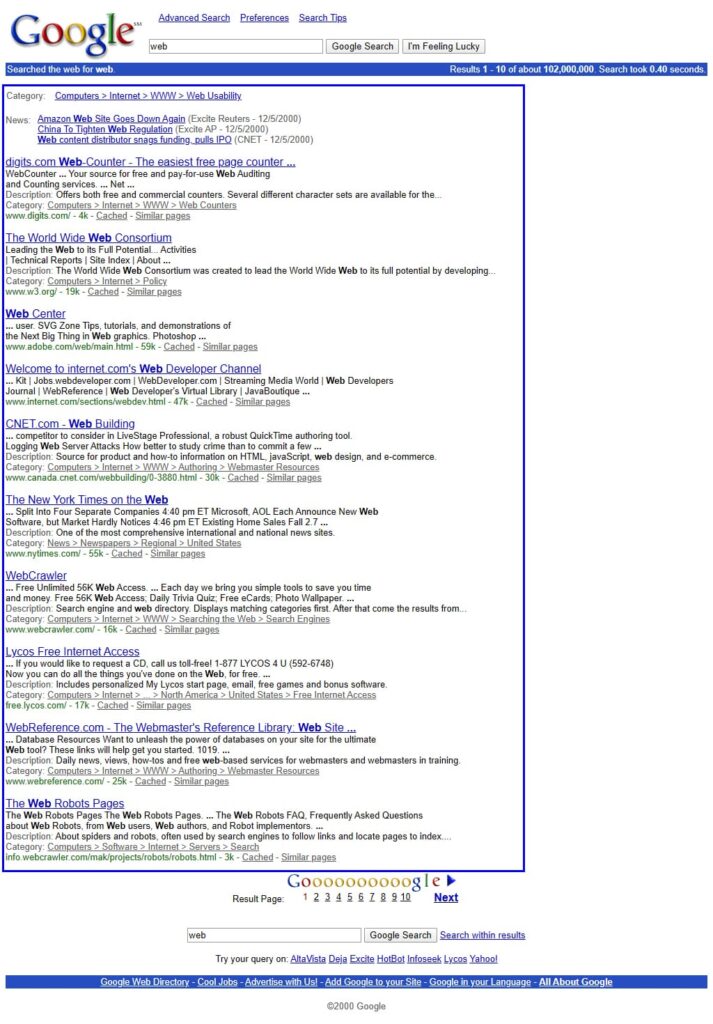
The list of websites highlighted above in blue was in fact the result of the work of Google's robot (googlebot), which had filed and labelled them to be displayed for a given keyword.
So you would search for 'web' and the engine would show you 10 pages of websites per page, from the most relevant to the least relevant for the searched word.
Point.
So many search engines still do...
But are you sure Google searches can be trusted?
Here, then, you should know that still in the early 2000s, Google began to offer more and more ads derived from its then fledgling product of corporate advertising "Google AdWords' (now called Google Ads).
At the time, the advertising results appeared like this (in red):

As you can see from the image above, the organic results (i.e. the natural ones, shown above in blue) were then pushed further down, and the space at the top has since been reserved for companies winning Google's auction for space on the relevant search query.
In the early years of the search engine, however, the advertising part offered by Google remained clearly marked and distinguishable (yellow background or all on the right).
The web surfer could then easily recognise it and decide for himself whether to click on it or not.
Over the years, Google Ads has, however, become increasingly greedy, influential, aggressive and devious.
Ads' (advertisements) in search results have increased dramatically, as have prices and revenues from Google.
But above all, their insidiousness with respect to natural results has become ever greater.
Why do I say 'insidious'?
Because since 2013, the coloured background that used to distinguish advertisements has been removed.
Not only that, we switched from the clearly distinguishable yellow 'ad' label on advertisements to a faint 'Ad' bordered in the same green colour as the URL (website).
Since clicking on search results reserves our brain an attentional space of only a few moments, it is very easy to make a mistake and click on advertisements instead of natural or 'organic' results.
So I'll rephrase the question posed a little earlier Is Google search to be trusted or is it just advertising?
Complete overview of the evolution of ads in Google
Here is a comprehensive overview of the evolution of Google ads on search results pages over the last 20 years or so to understand whether to trust Google searches:
To date, advertisements are practically indistinguishable from a normal search result (except for a small "Ad' in black before the site).
These actually deceive the surfer, who places his trust in the search engine and thinks he has found the most honest and trustworthy answer to his search query.
Not least, Google has managed to create in the user a gradual habit of clicking on advertisements, so that the behaviour appears normal to him, although it is clearly not within the scope of a search engine.
The following image shows how since 2013 (with the removal of the background) and subsequent tests, the user actually ends up further and further away from the normal search results provided by the Google robot (i.e. the websites that are supposed to receive clicks for a particular search query).
Remember the initial statistics?
Well, on average we do 20-30 Google searches per day (i.e. 600-900 per month and 7,300-11,000 per year).
As you see from the graph, in 2021, about 80% of your Google searches statistically end up either in an advertisement or in the Google OneBox/Snippet (which we will explain later).
Clearly, the advertising space provided by Google is not given away... but rather auctioned!
And clearly the bigger and more billed the company, the more it can afford the high price of these advertising spaces.
It can reach exorbitant prices as you read here: $50 per click.
That is, for each person who clicks on the Google Ad in the search results e.g. for "what is the best health insurance?", the buyer of the advertising space (probably an insurance company), pays $50.
And this is regardless of whether the navigator stays on the insurance site or not, whether you buy or not.
Today, for a start-up or a small medium-sized company it is practically impossible to participate in auctions for keywords and search queries large enough to accommodate the masses.
Even if that start-up or SME has a better or more ethical product than its competitors.
There will always be a larger existing company on the market that is willing and able to afford to spend more than the small company.
And the result for the user?
Well it is to be constantly exposed to the usual brands and 'big American players' with the usual products, which nowadays with globalisation cover 360° around us.
Ah, I forgot... Google is American and it is typical of Americans to push American products before anything else, unless they are related countries or products that suit Google ;).
It was over...
But it is not... unfortunately, and we explain again why Google searches are not to be trusted.
With the advent of several new parts of Google's algorithm (universal search, google instant, knowledge graph, the addition of intelligence features, google now, etc.), it has recently made independent (non-Google-related) websites that had hard earned the first page naturally disappear from the search page!!!
Here is an example.
A few years ago, a search for the word 'flowers' produced this page:
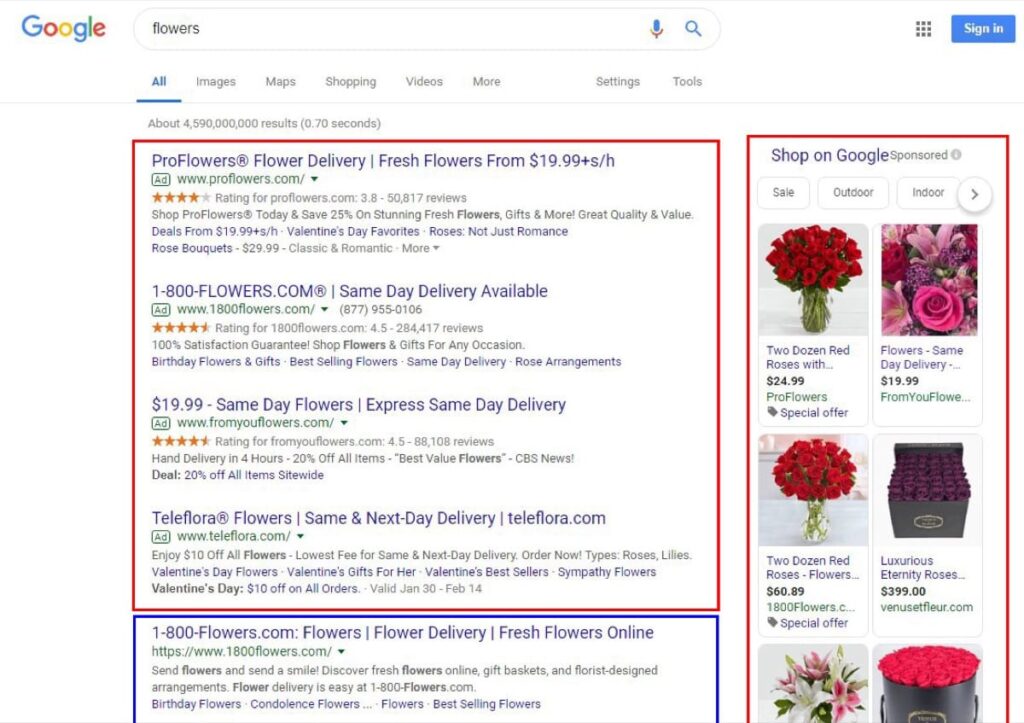
4 advertising results at the top (in red) and then underneath began the organic ones (in blue).
On the right hand side, you could see the flower-related products on Google Shopping (an additional Google Ads product born in 2010).
What now?
Now produce this:
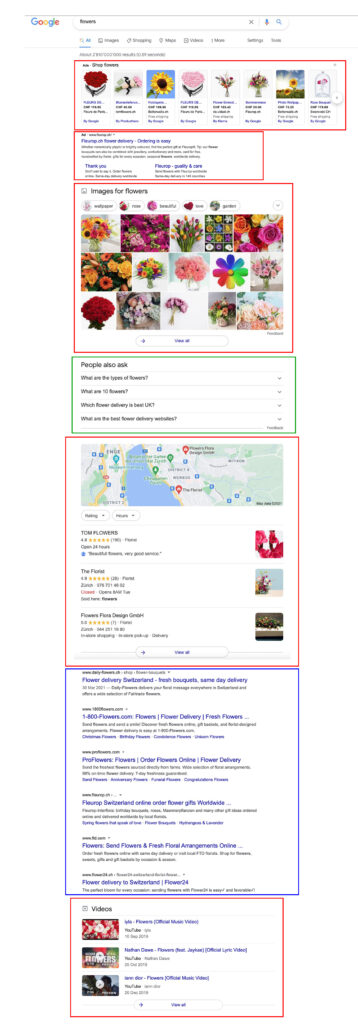
In red I have highlighted the Google advertising results, in blue the organic ones (sites outside Google that were found by the Google robot and results relevant to the keyword 'flowers') and OneBox functionality in greenwhich we will discuss later.
Note that I have included the results and youtube videos at the end and 'images for flowers' under Ads.
This is because youtube is now infested with Ads before the video (and we all know this) and once you click on any of those images at the top, this pops up:
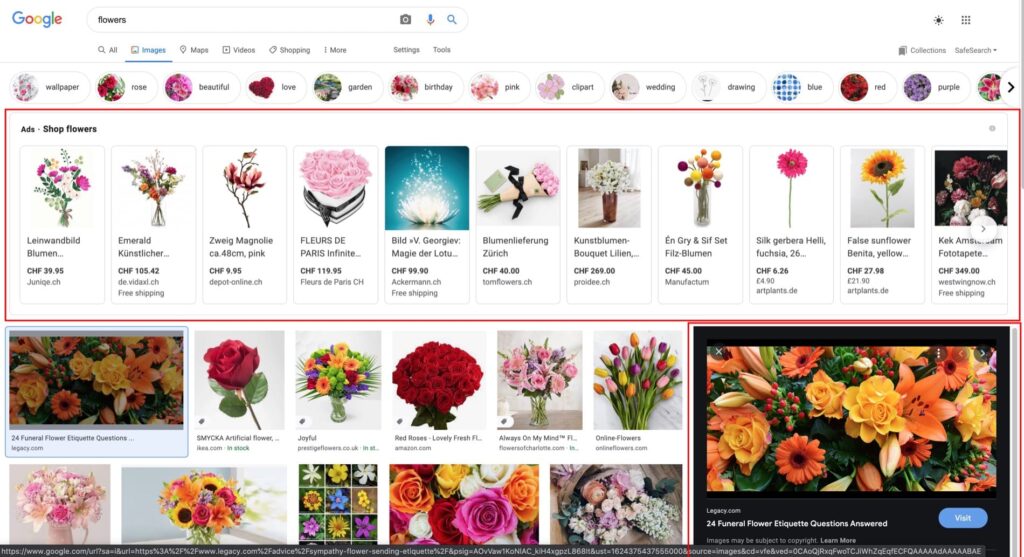
Where at the top, again, are Google Shopping Ads!
Not only that, on the right, disguised as an organic Google result, we find a black box that appears to be a blog answering questions about flowers for funerals.
Clicking on this result again lands you on this site (legacy.com):
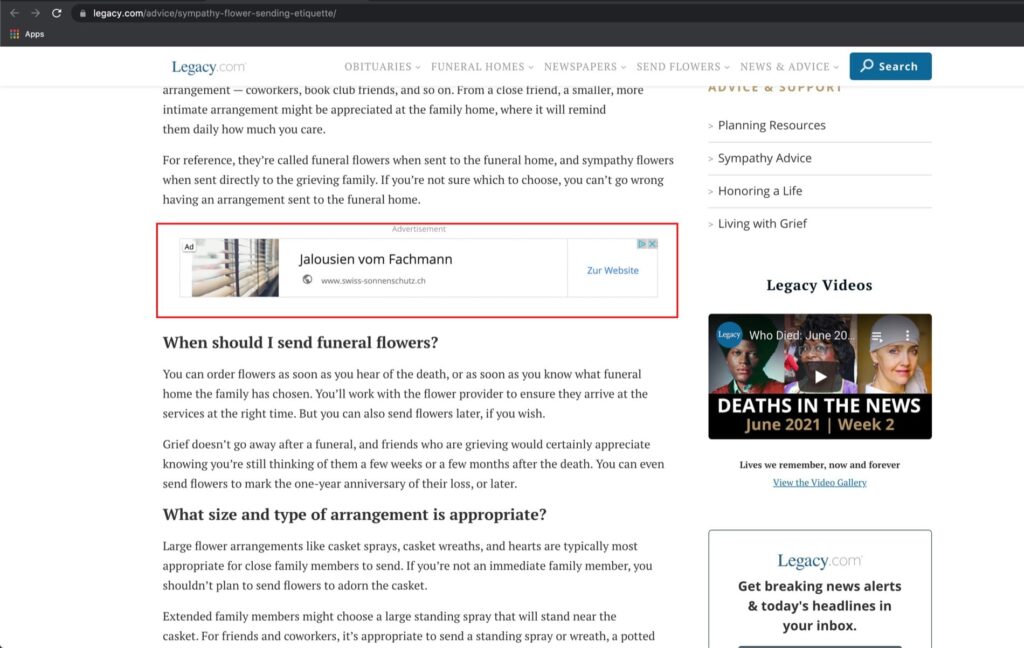
Which among all these questions and answers, guess what is in the middle?
Google Ads again!!! (above in red)
This site and 38.3 million others are part of a Google programme called AdSense.
That is, any blog of any nature and writing on any subject, can join the programme and Google automatically places its advertisements within the text, breaking it up. Clearly advertisements that are perfectly relevant to the content and that are modelled on the user (thanks to the profiling that Google does of you).
So Google many times it actually pretends to promote organic results (previously highlighted in blue), while it actually promotes its AdSense network of almost 40 million websites covering every conceivable topic.
The keyword 'Flowers' is searched by millions of users worldwide, but only one Ad appears in the second red box at the top of the search results.
Have you wondered why?
Surely there are thousands of online flower shops in the world in 2021 that would like to appear for 'flowers'?
I performed this search from Switzerland, and Google knows well (from its experience) that showing me a Swiss site to buy flowers would have a better chance of me clicking on it (and thus of it earning money... remember that it usually only earns money from the moment we click on it).
So it narrowed the field down to only Swiss flower eCommerce.
But one might again ask: with all the small and medium-sized Swiss online sellers, why did only 1 Ad belonging to the fleurop.ch site appear?
Simple, because that space for the keyword 'flowers' costs so much that no one else can afford it...
If we take a closer look at the company behind it, we find 'fleurop-interflora (switzerland) AG' on the Zurich Commercial Register, with a share capital of almost 1 million.
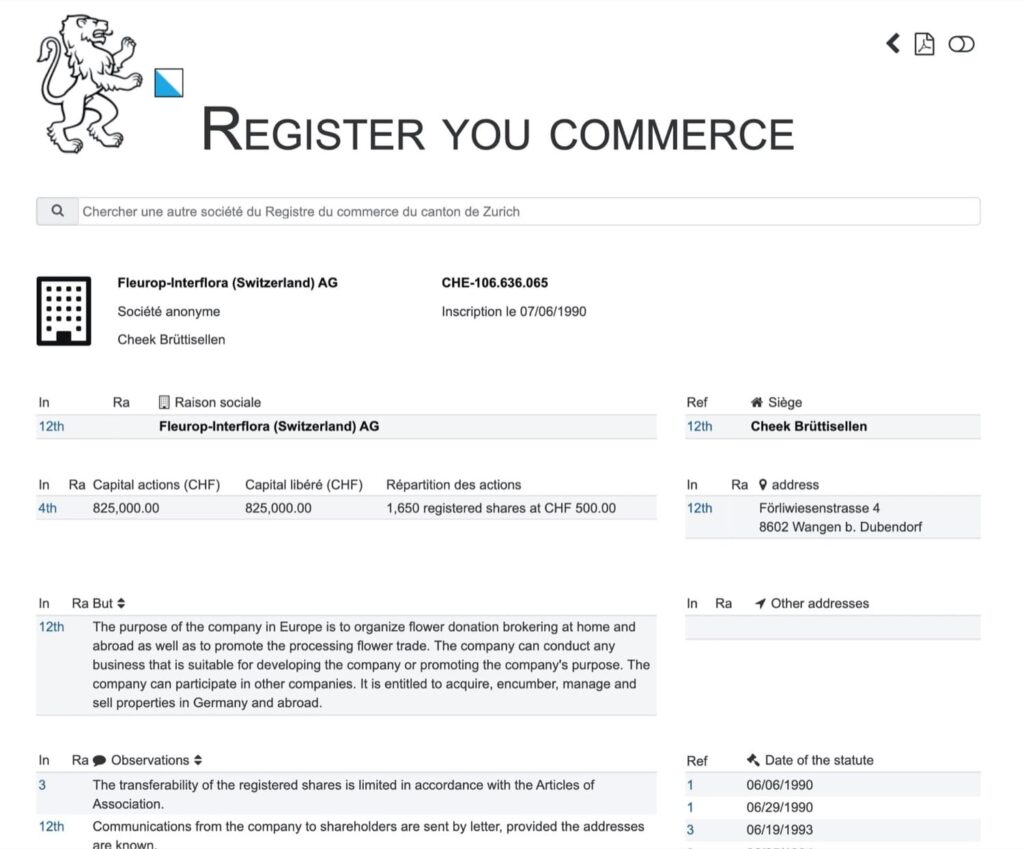
Investigating a bit it turns out that the company is the Swiss subsidiary of the world's largest conglomerate trading in flowers (fleurop.com).
I quote from the site:
[Fleurop-Interflora is the largest floral company in the world, connecting more than 40,000 retail florists worldwide, offering an international floral delivery network in over 150 countries and processing over 25 million orders each year.
Looking behind the scenes, the website fleurop.ch has in fact more than 2,600 Google Ads and their pages enter the search results of more than 25,000 words!
In short, there is a huge colossus behind it with a monthly budget for Google Ads of 4-5 zeros and monthly traffic from Google of 153,000+ visitors per month!!!
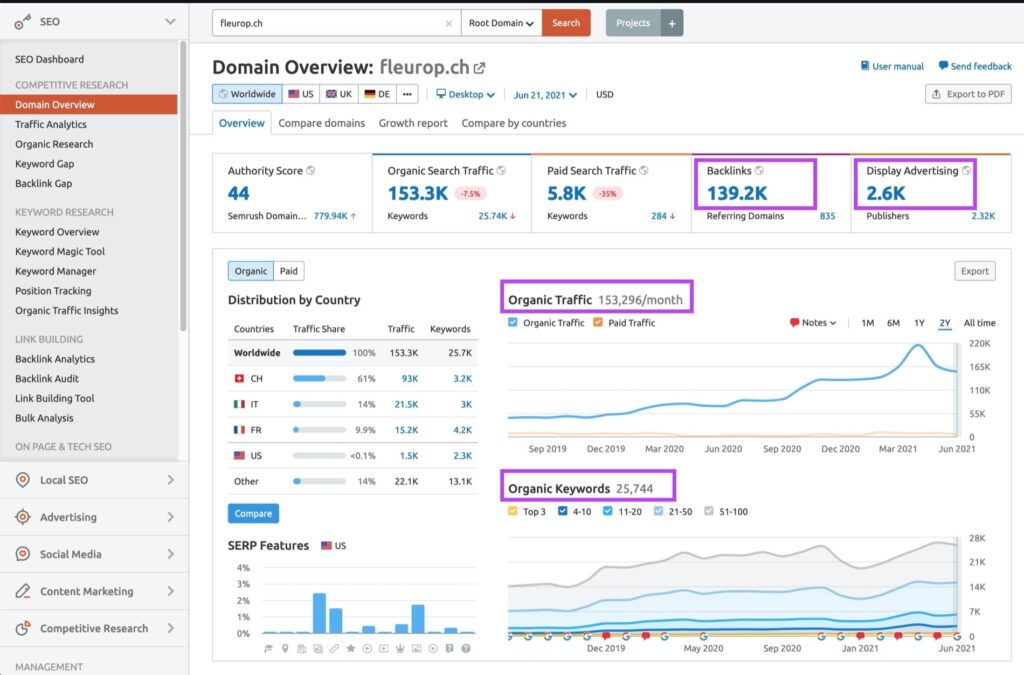
What if I wanted to open a small flower business trying to show my site on Google Search for the word 'flowers' to potential Swiss customers?
Let's have a look directly in Google Ads.....

I see that there are 1,000 to 10,000 searches per month in Switzerland for the word 'flowers'... and Google warns me that the competition for that keyword is 99 out of 100, i.e. it is literally FULL of actors competing for that word!!!
And since it is an auction... whoever pays the most at that given time and place (desktop, mobile, google search, google shopping...) wins!
Google also warns me that appearing at the top would cost me on average 3.52 CHF per click that the navigator makes on my ad (even though it usually ends up spending more than Google predicts).
Now, in 2021 and only if your site is outstanding, for every 100 visitors you get approximately 2 buy (2%).
This means that If I want to bring 100 visitors to my website from Google Ad and pay them 3.5CHF per click, I have to spend about 350 CHF!
And then hope that out of those 100 visitors I have 2 who buy!!!
And also hope that those 2 who buy will spend at least 180 CHF each to break even, which probably won't happen unless I sell flowers that magically produce pine nuts or saffron!
Clearly, the discourse is much more complex than that, because we buyers are usually loyal to the site and do not make a single order.
But all this serves to make you understand how a small company today does not have the liquidity to undertake a long-term effort on Google Ads that would allow it a return on investment.
You can therefore understand how Google Ads has become an exclusive and elitist advertising channel.... to large companies or start-ups with large investments or capital behind them.
And again... you ask yourself, is Google search to be trusted? We answer you: this is not the end of the story!
We have realised that Google's search engine nowadays has very little left but an immense pool of underhand publicity.
Google OneBox
But what is the Google OneBox highlighted in green?
It is a special space that Google, for certain keywords, activates and dedicates on the search page.


It usually contains 'information' taken from a part of its algorithm called 'universal search' showing e.g. images, products, weather, stocks, the result of a mathematical calculation, frequently asked questions, etc.
I will not elaborate because it is well explained with pictures at this link.
In itself, it might seem like a harmless initiative that helps people get the information they are looking for more quickly and without clicking any links....
But the point is In doing so, it goes against its very purpose for which it was conceived and proclaimed: a search engine.
That is, to act as an objective medium showing the most relevant websites for a given search query.
With OneBox, on the other hand, Google's artificial intelligence algorithm already provides you with the answer to your questions, without acting as a go-between any more... you see for yourself that there is a major paradigm and role change!
Since the human brain is lazy by nature, we tend to 'trust' Google and take the immediate answers it gives us at face value, without searching further.
For instance, we do not even scroll down to the top organic search results to get answers from a variety of sources or the average of these, so as to get an answer that most closely reflects truth or reality.
The problem usually does not arise with answers for which there is only one reality, e.g. the weather, a mathematical result, the capital of Germany, etc.
Are we to trust Google searches, for example, when we ask more open-ended and free interpretation questions? On historical questions? On questions where different points of view are important? On news? On advice?
Google has recently transformed itself from the:
"provider of answers given by a multitude of actors" to "provider of answers given by a multitude of actors embedded in a myriad of advertising content" to "the main, global and unique actor that directly gives answers collected and pre-packaged by an artificial algorithm".
He broke the boundaries that an actor with his purpose, albeit huge and global, should have.
Filtering and proposing immediate answers, filtered and pre-packaged by an algorithm, is extremely dangerous as a lot of history and 'information' nowadays is learned through the internet.
Especially on the part of young people.
"Learning" is not just drinking the first rant generated in a second by an intelligent machine programmed by the largest technology company on the planet with a net profit of 40 billion a year.
Learning means, above all, to confront different sources of information and opinion and to train one's capacity for rational discernment, comparing it with one's own knowledge, morals and practical experience.
The context plays an important role, as does being able to distinguish whether a source of information is reliable and whether and what interest it has in providing you with a certain answer.
For example, would you ask an oil company whether they think the sun is a good alternative energy source? 😉
The problem, then, with Google OneBox is that it is not limited to questions where the answer is only one, but its AI algorithm has begun to extract from the context 'information' that it deems valid on the basis of certain criteria, filters it, pre-packages it and serves it up in response to search questions.
Look at the following example for the research question 'who are the hippies':
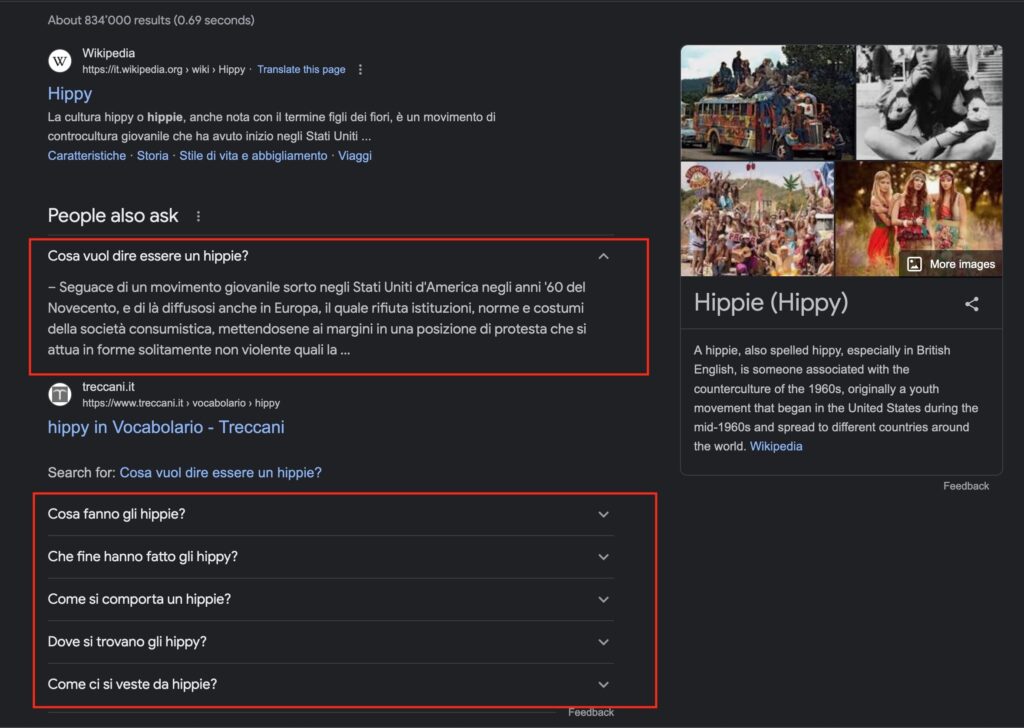
It is statistically proven which only 9% of the users reach the bottom of the page (precisely where the true, heterogeneous search results reside).
This means that 91% of people find the answer in the top section of Google search resultswhich is where the information of the OpenGraph, the OneBox and the advertisements reside.
That said, Google is succeeding in sculpting people's knowledge of certain topics through the OneBox's immdiate responses thanks to its artificial intelligence algorithm fishing 'information' (surely not at random) out of context, without in any way verifying its veracity, and sometimes even modifying them to his liking!!!
In the example above, prior to 2012, people found themselves clicking on different websites about hippies and showing a diversity and multitude of context, history, and information associated with texts, videos, testimonies.
They were trying to show evidence to be a reliable source of such information.
Now, all the 'necessary' information about hippies is summarised in 4 questions (highlighted box above) that Google has pre-packaged for you.
Clicking on it opens up another myriad of questions and answers collected by the OneBox on hippies and generated again and again as you scroll down, hiding the results of other sites from you... until you consider your thirst for knowledge on hippies satiated.
To be noted that sometimes the questions are entirely formulated by Google's algorithm, as well as collected.... well after all, it is very easy for an algorithm that in 2021 can creating faces of people that do not exist, assembling pieces of faces here and there.
Great, isn't it?
No!
Because you have missed the crux of the matter: who decided that the most important questions and answers to be fed to the entire human population about hippies are (I quote from OneBox)
- Who is a hippie?
- What are hippies called now?
- Who is the most famous hippie?
- What are the characteristics of a hippie?
- How did the hippie movement come about?
- Where do hippies come from?
- What happened to the hippies of the 1960s?
- What stopped the hippie movement?
- Why are hippies hated?
Don't you notice how much these questions revolve around the main issue for which the hippies were born and remain incredibly superficial to everything the movement really was in the 1960s?
I mean, 9 questions and "What are hippies called now?" or "Who is the most famous hippie?" would be important questions to grasp what the movement was and who are hippies?
Not to mention the fact that the last 2 questions bring a negative connotation to the movement... I mean, who says the movement has stopped? who says hippies are hated?
One last point... what about questions concerning health?
As in the example below "How to cure a headache...'
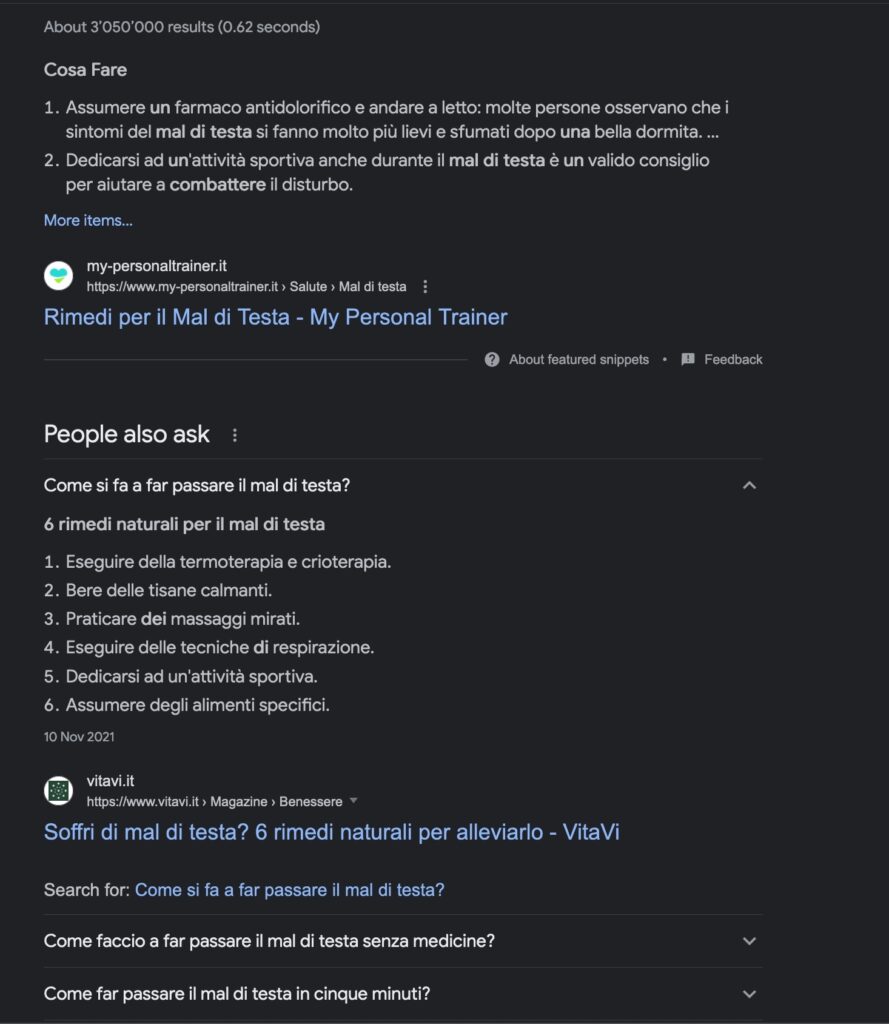
The first response suggested is '... take a pain-relieving drug'....
Or 'How to achieve happiness?"
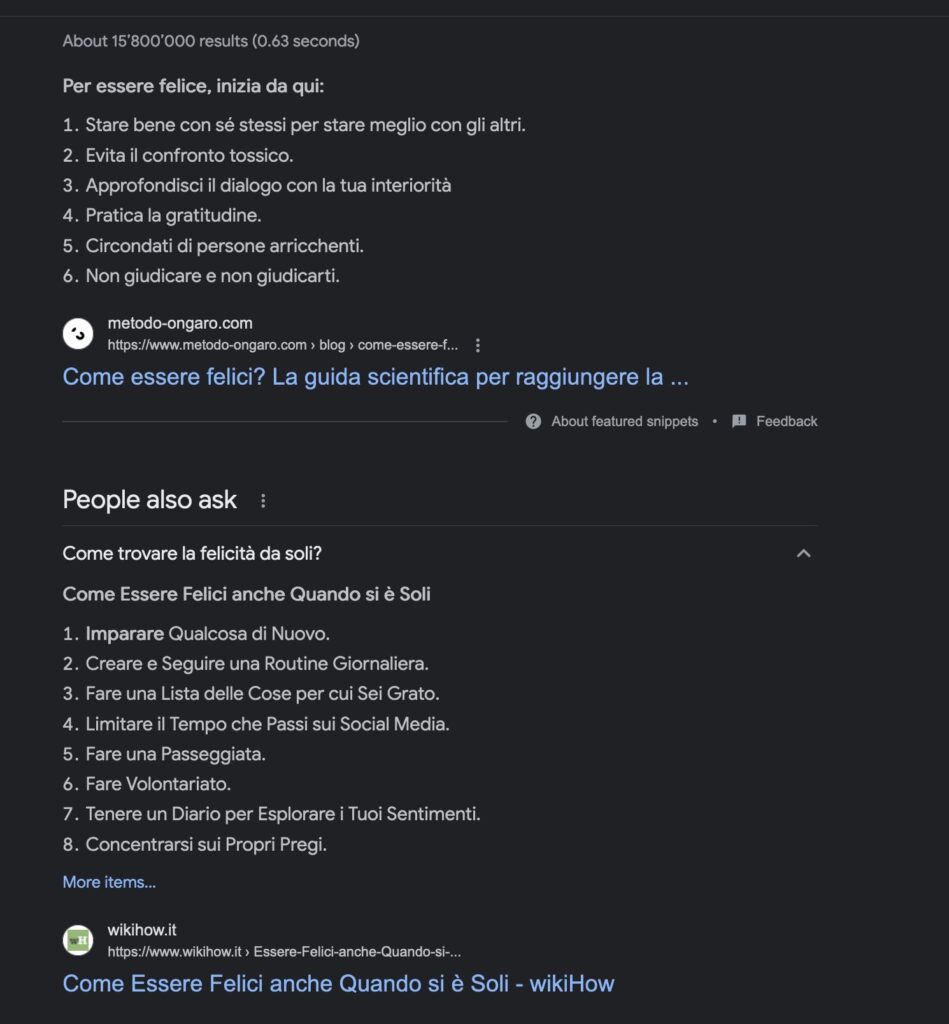
It seems that for every topic, even and especially the most important ones, Google has been proposing its worldview for years, sculpting the knowledge and way of thinking...
I invite you to further interpretations and judgements and leave you with my personal reflection and fear:
“That of waking up in a world where we no longer discuss what the hippie movement was because everyone 'already knows everything'... or worse... where we avoid asking our father or grandfather how he experienced the hippie period, because a machine has already 'explained' it to us





